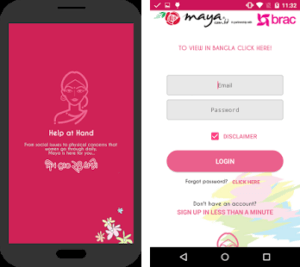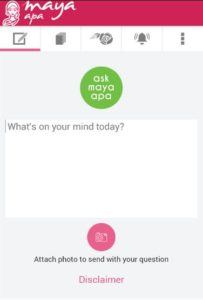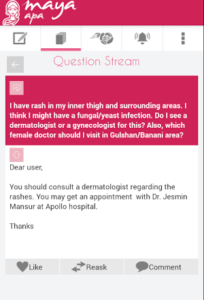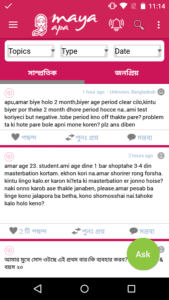Sex Ed One Click Away!

Leverage mobile technology to provide personalized health services one click at a time!
In many countries where Muslim religion and culture is prevalent, sex if often a very taboo topic. Such is the case in Bangladesh. Formed in 1971 following the Liberation War where it gained independence from Pakistan, Bangladesh is one of the poorest countries in the world. According to the UNICEF, it has the highest rate of child marriage, with 29 percent of girls married before 15. Given high poverty levels and the serious health consequences associated with early pregnancy, each year about 600,000 women die from complications related to pregnancy or delivery. The cultural stigma associated with sex education makes it very difficult, especially for young girls, to talk about sex and health problems. As a result, various types of health, social and legal problems go unsolved.
Furthermore, less than 10 per cent of births take place in health centers, the remaining done at home, attended by relatives or traditional birth attendants. This explains why Maya Apa, an e-health platform, has been a blessing for many women who often had questions and problems that no one else was willing to discuss in such a conservative society. Leveraging the fact that over 50 million women owned a mobile phone, with close to 80% expected to be internet enabled, the app has been developed with basic features in mind in an effort to reach the masses, especially rural women.
In under a minute and from the privacy of their phones, Bangladeshi women can sign in, create an anonymous profile and post a question in English or Bengali. The legal, medical and other relevant professional experts address the questions pertaining to their field and find solutions within 48 hours. The app also serves as a platform for the community to engage in the Q&A thread, allowing for peer-to-peer information exchange and constructive discussions to take place on matters women generally shy away from discussing openly. The previously asked questions remain available to the public, including unregistered members, avoiding repetition and allowing the professional staff to best utilize its time and answer the maximum number of questions on a daily basis.
For an anonymous interviewee, the Maya Apa app also provided a platform to also talk about domestic violence and seek legal advice on how to get a divorce and retain custody of her child. “No one in my family was willing to help me – they didn’t want me to leave my abusive husband. They kept on telling me: What would people say about a divorced daughter! Learn to adjust … At last, I heard about this app and posed my question, not really expecting much. But then I was surprised at the support I received. In addition to providing me a step-by-step answer, Mapa Apa also connected me to a legal aid organization which helped me through the process.”
Essentially, Maya Apa managed information flow between many women in need of answers and the health professionals eager to help with the limited infrastructure available. In many hospitals, nurses and doctors are embracing the platform and instead of waiting for patients who often have to come from far away, nurses and doctors can now answer questions remotely. Furthermore, the app is used to deliver prevention and awareness information via text message to pregnant young mothers, allowing for healthier prenatal care and a reduction in birth mortality. Fundamentally, this app has revolutionized the Bangladeshi health care space by improving access to information and increasing patient engagement.
Although this is a great start in solving the country’s myriad of social issues, additional steps can be taken to improve its social impact.
- For fatal chronic diseases such as AIDS and malaria or for children vaccinations, push notifications can be sent as reminders to comply with medications
- The app could scale up in infrastructure (such as additional servers) and serve as a platform to gather data as part of a larger integrated plan to implement eHealth services for women and children.
- Similarly, the Maya Apa app can be leveraged as an important tool for patient management. The patient’s entire medical history could be stored and easily accessible to doctors when in an emergency intervention or to provide treatment.
- The team at Maya Apa could set up drives to rural areas to train those that may not have the skill set to use the website or mobile app. While some may have the skills and aptitude to use a smartphone, many do not.
- The app can also be developed to serve as a training interface for traditional nurse attendants. According to the WHO, Bangladesh has 5.8 physicians, nurses and midwives per 10,000 habitants. Through the app, traditional birth attendants could access to knowledge and training online, thus increasing the supply of healthcare providers and improving mother and child survival rate at birth.
Additional exhibits
Sources:
http://www.maya.com.bd/#/
http://www.thedailystar.net/impact-journalism-day/maya-apa-knows-it-all-1244458
https://en.wikipedia.org/wiki/History_of_Bangladesh
http://thetechportal.com/2015/09/04/maya-com-bd/
https://www.unicef.org/media/files/Child_Marriage_Report_7_17_LR..pdf
http://www.who.int/pmnch/knowledge/publications/bangladesh_country_report.pdf?ua=1
http://www.thedailystar.net/impact-journalism-day/maya-apa-knows-it-all-1244458
http://www.pri.org/stories/2015-04-06/bangladesh-app-lets-women-speak-without-fear







This sounds like a truly amazing service – filling a huge unmet need in a way that is accessible and can scale well. As you point out in your suggestions, there’s a huge potential for an app like this to expand beyond just obstetrics and gynecology into other areas of healthcare – whether chronic disease management (AIDS or diabetes) or general health literacy (nutrition, education). It could also be used as a social platform to empower women – currently it offers legal advice and interventions for domestic violence. That service could be expanded to potentially offer other services to women such as small loans, family planning education (both medical and non-medical), and even helping foster a local community of women in a given area. There’s tremendous potential here and I hope this takes off.
Also, 600K women dying from pregnancy/childbirth complications seems really high – WHO has a smaller number for the world (http://www.who.int/features/qa/12/en/)
This was an informative read on an app filling an important and unmet need in a developing country. I think that, in addition to the suggestions you noted, there is an opportunity for Maya Apa (or a partner) to offer a parallel service for men. An article from the NYT on Maya Apa notes that many of the reviews praise the usefulness of the app for men as well [1]. Educating women and providing them with a forum is incredibly valuable, but many of the topics revolve around partner-related issues, so it may be a one-sided solution. Especially since the marriage age is so young in rural areas of Bangladesh, it would be critical to educate men as well so young couples and families can make educated decisions. To open the services to men and women could also make both partners more evenly balanced in the decision-making process, potentially reducing tensions or conflicts caused by asymmetrical knowledge.
[1] http://nytlive.nytimes.com/womenintheworld/2015/03/25/health-app-is-designed-with-a-womans-touch-and-is-just-for-women/
Great summary and critical analysis. I really liked the point you made about sending out teams to dispatch to rural areas as I could see this as driving adaptability and efficiency of use. With approximately 80M females in Bangladesh (http://countrymeters.info/en/Bangladesh), it would be important to increase the access to internet-enable mobile phones. Nonetheless, I am a little concerned about the reaction of the community to a Maya Apa “wolfpack” and if the local female population would be open to meeting given the taboo nature of the topics. Perhaps Maya Apa could implement a similar system as ITC eChoupal with a centralized local leader capable of connecting others to the platform. This could have the potential to be more discrete both between Maya Apa and the community (only requiring Maya Apa contact with one community member) and within the community (system could be aligned among existing community relationships) while still improving access to the platform and efficiency of extracting value from the platform.
Thank you Amy, this was a really interest blog post about an unmet need I was completely unaware about — women’s health and wellness in a Muslim country where women get married very young. I agree that there’s tremendous potential for Maya Apa to expand its impact in Bangladesh. It sounds like the availability of smartphones will be a huge constraint in Maya Apa’s availability. It appears that in 2014, smartphone penetration in Bangladesh was only 5% (https://www.telenor.com/wp-content/uploads/2014/06/04-Grameenphone-IFA-presentation-FINAL.pdf). Although this penetration might be doubling each year, Maya Apa could extend its reach by being available on feature phones, just as how Facebook launched Facebook for Feature Phones back in 2011. I also wonder if there’s a difference in mobile phone penetration across gender. Will women feel safe communicating with Maya Apa if word gets out that Maya Apa is helping to increase female empowerment and undermine the patriarchy that many women are living under? I am curious how Maya Apa can continue to grow in accessibility while maintaining itself as a private channel for women.